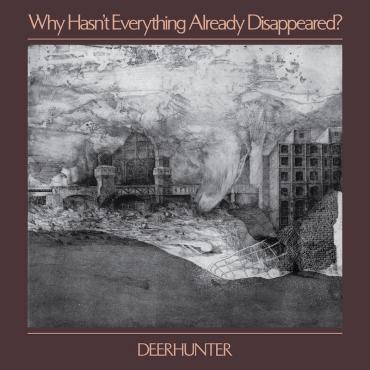Deerhunter’s Metamorphosis Continues

Revisiting Deerhunter’s second release, 2007’s Cryptograms — a project that revels in protracted segments of drone-and-swirl, experimental trajectories unfolding as minimal but intense jams — I’m struck how the purely sonic elements contextualize Bradford Cox’s avant-garde songwriting and idiosyncratic vocal delivery, much of which occurs as Dadaistically disjointed or fragmentary, the project achieving cohesion via subtle, cumulative, and chorus-like emotional tones. While Cryptograms is Deerhunter’s most musically uninhibited album, the bold atmospherics operate as a complement to Cox’s presence, whether lyrical, vocal, or energetic. That is, even early in their oeuvre, Deerhunter occurs as a song-oriented band. With 2010’s Halcyon Digest, the group focused more concentratedly on pop elements, still navigating uber indie contexts, Cox’s songwriting attaining a new plateau, in terms of melodic and lyrical memorability. While the band forged compelling soundscapes, contributions were more restrained and condensed, Cox emerging as an accessible songwriter and frontperson. With 2013’s Monomania, the band transitioned into a near-perfect integration of exploration and pop sensibility, songwriting and atmospherics undergoing a seamless and dynamic blend. It was with this album, too, that Cox demonstrated his full absorption and reconfiguration of the tonal, mystical, and, in artistic terms, paternal influence of John Lennon.
Deerhunter’s releases have chronologically progressed from an emphasis on the personal and visceral to the more detached and philosophic, 2015’s Fading Frontier definitively framing Cox as the consummate observer. Deerhunter’s new release — Why Hasn’t Everything Already Disappeared? — is the band’s most equanimous set to date, which isn’t to say that the singer isn’t plagued by critical existential questions. On “What Happens to People?” Cox asks, “What happens to people / their lives up in arms / what happens to people / they quit holding on?” His vocal is atypically smooth, as if he’s more likely to lilt than howl, more indebted to Frank Sinatra and Leonard Cohen than Lou Reed and Thurston Moore. Instrumentation is orchestral, euphonious, and reassuringly spacey. Cate LeBon’s harpsichord on “Death in Midsummer” is primitivistic, tethering the track to earlier and more lo-fi recordings, Cox’s melody supple and sultry as he reports: “Your friends have died / and their lives / they just fade away.” And: “ … in time, you will see your own life fade away.”
The anonymizing effect of death and how to secure meaning amidst an experience that is clearly finite (life) are predominant themes throughout Why Hasn’t Everything Already Disappeared? “Element,” the most melodically and vocally compelling track on the album, and the piece in which notable instrumentation and pop elements are best balanced, addresses these issues obliquely: “Cancer was laid out in lines. / The road was wide. The road was silent. / Curtain call for all those lives / spent surviving for that final day.” “Detournement” is a spoken-word piece reminiscent of Laurie Anderson circa Big Science, a boom-voiced monologue that addresses the human experience in global terms, implicitly suggesting that people are essentially alike regardless of cultural differences. On “Futurism,” Cox addresses the ineluctability of conditioning: “Your cage is what you make it / if you decorate it, it goes by faster.” Freedom is an ability to remain creatively proactive within unshakable parameters, an intention rather than a nirvanic condition. “Plains” highlights Deerhunter at their most pop-capable, Cox’s vocal buoyant, delineating a metaphorical passage à la The Tibetan Book of the Dead, a dream-narrative in which elements of Eros and Thanatos are effectively melded. The album closes with “Nocturne,” resembling Deerhunter’s MO pre-Halcyon Digest, Cox’s vocal heavily effected, imploded, echoey, his tone more strained and classically confessional (“ … the basement was so moldy and wet. / Mildew spread like spiderwebs on these back back back country roads”). The final three minutes of the song (and album) feature a sprawling but spirited repetitiveness, a looping instrumentality that lulls the listener into a reflective trance.
Some lament and will continue to lament Deerhunter’s distancing from the otherworldly sonic textures and vocal histrionics of their earlier work, epitomized by Cryptograms. Others will celebrate the latter half of Deerhunter’s oeuvre as a matriculation into artistic maturity. Albums such as Fading Frontier and Why Hasn’t Everything Already Disappeared? show a talented band and singer transmuting popular precedents rather than instinctively rebelling against and rejecting them (which, ironically, only makes them more apparent). While there’s something naturally magnetic about certain artists’ early (even initial) work (John Prine, Velvet Underground, Patti Smith, Alanis Morrissette, The Strokes, Bright Eyes, among others), it’s equally impressive to see them embracing a wider range of elements, doubling down on signature defaults while mining the collective musical pool. I’ll probably never tire of hearing Cryptograms and can’t imagine not regarding Monomania as the band’s apex; Fading Frontier and Why Hasn’t Everything Already Disappeared? are significant albums, however, stylistic milestones for Deerhunter as well as fertile additions to rock’s ever-broadening landscape.



